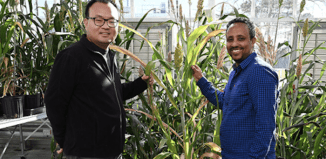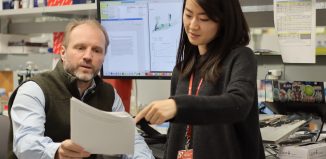BNL’s Liu studies signals in plant pathway
Many of his colleagues are focused on the instructions the factory has to follow. Chang-Jun Liu, however, is more concerned with the on and off switch. The factory, in this case, is a plant cell’s genes, and the on and off switch are the signals that indicate when to start and stop production of a class of chemicals called phenols that are used in everything from flavoring foods to promoting cardiovascular health.
Liu, a scientist in the Department of Biosciences at Brookhaven National Laboratory and an adjunct professor in biochemistry and cell biology at Stony Brook, looked at a process in which a key enzyme, called phenylalanine ammonia lyase, gets removed or broken down, slowing or even stopping the process of producing phenols. He and his research group are exploring ways to fine-tune the concentration and activity of PAL. With less PAL, plants, in this case an Arabidopsis plant that is widely found in backyards around Long Island, produces less phenol.
“You can enhance the final production or reduce the final production” depending on “the application” scientists or industry are seeking, Liu said. “We know how this process works. We can turn down those kinds of proteins, and prevent the degradation of a key enzyme or we can increase the activity.”
How much phenol scientists or businesses desire in plants depends on the application. Phenols are a part of a large class of compounds that are made of both small molecule chemicals and larger polymers. The smaller phenolics are used in foods, beverages and cosmetics, providing fragrances and flavors. The typical example of this is vanillin.
Most phenolics have antioxidant properties and can potentially prevent cardiovascular disease, treat cancer or prevent obesity, Liu said.
Other scientists praised Liu’s ability to apply his basic research into a range of other arenas. “What’s really remarkable about his work is he does a lot of things that have fundamental basic importance in science and takes them to translational situations,” said Brenda Winkel, professor and head of biological sciences at Virginia Tech. “He’s able to take [his research] and find the practical uses of these new insights. That is really unusual.”
Liu, who worked with postdoctoral research associates Xuebin Zhang and Mingyue Gou, said other researchers have exerted considerably more energy in developing a gene regulation approach. Liu, however, worked at the protein level, exploring how to use the cell’s own recycling system, either to keep a protein that encourages the production of phenols in place, or encouraging its removal, and decreasing the manufacture of phenols.
Plants use these phenols for a variety of purposes, most notably to react to changes in its environment, either from variation in its habitat or an attack by a fungus or bacteria. “If you manipulate those phenolic compounds” Liu said, “it will increase the resistance of a plant to environmental stress and therefore increase the ability of plants to live” in harsh conditions.
Liu’s next steps are to apply this understanding of how to alter phenol synthesis to other plants, including in horticulture. Increasing phenols can increase coloration intensity among different flowering plants, he said, which might be a desirable trait for people looking for a particular hue.
He also wants to expand his study to other crops like poplar trees. Taking lignin out of poplar trees to generate paper currently requires “harsh chemicals that are bad for the environment,” said Winkel.
Winkel said Liu’s work with biofuels is a crowded field and “big deal folks have been in it forever” but Liu is “right in there with the giants of the field, making unique contributions.”
A resident of Rocky Point, Liu lives with his wife, Yang Chen, a teacher’s aid at Rocky Point Middle School, and their two children, 14-year-old Allen and 12-year-old Bryant. Liu, who grew up in China, said he has gradually started to learn to ski.
He’s been to Blue Mountain and Shawnee in the last few years and calls himself “still a learner” on skis. “It is extremely exciting when you challenge yourself and do something a bit beyond your ability,” he said.
As for his work, Liu said he feels a satisfaction about his findings. “I’m pretty excited,” he said. “We continually want to look for more potential applications.”






